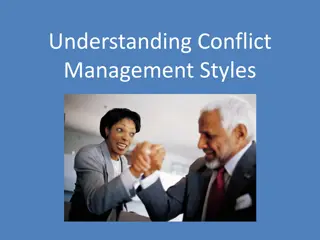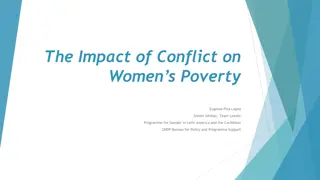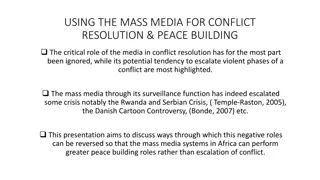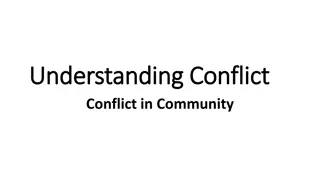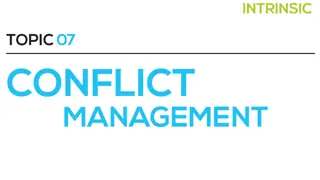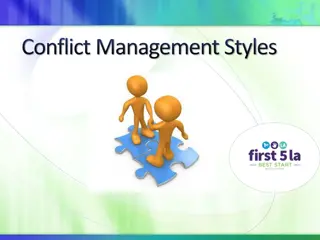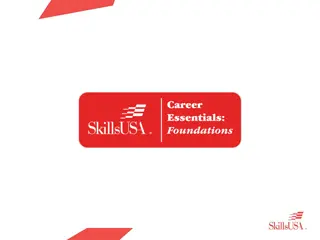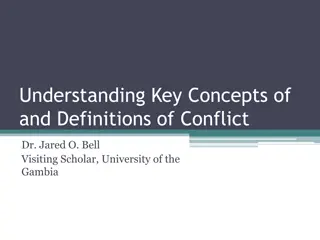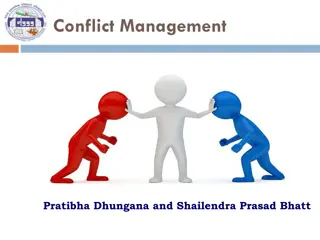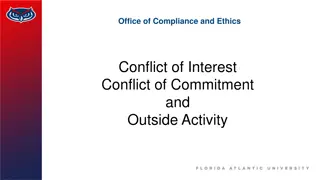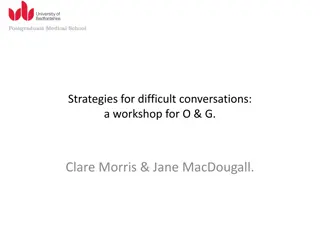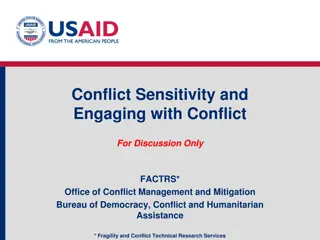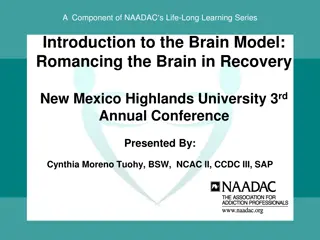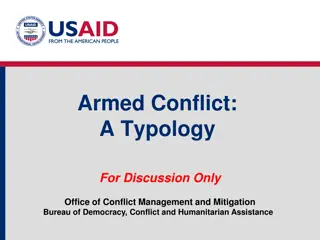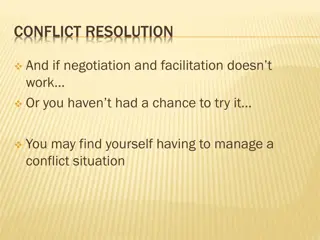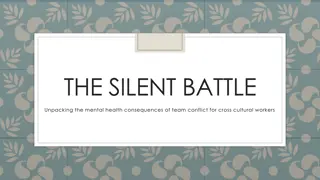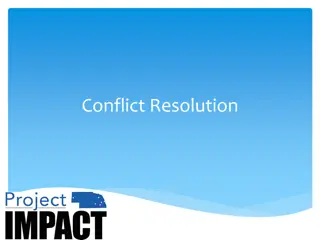Effective Strategies for Managing Interpersonal Conflict at Work
In this seminar led by experts in organizational psychology, attendees learn practical approaches to reduce interpersonal conflict fallout in the workplace. Discussions range from understanding individual and organizational factors influencing conflict to exploring remedies for resolving conflict es
1 views • 21 slides
Theories Explaining Deviant Sexual Behavior Throughout History
Explore historical theories on deviant sexual behavior, including demonological, anomie, psychoanalytical, human ecology, and somatotyping theories. These theories range from supernatural beliefs of possession to scientific interpretations of societal influences and individual characteristics.
2 views • 33 slides
Understanding Conflict Management Styles in Campus Life
Conflict management styles play a crucial role when resolving issues on campus. Knowing how to handle conflicts effectively is key to managing stress and navigating various situations. This article explores different conflict origins, the positive aspects of conflict, five common conflict management
0 views • 14 slides
Conflict Management Strategies in Organizational Behavior
Explore strategies for managing conflict and negotiation in the workplace, including the importance of conflict resolution and crucial conversations. Learn about the history of negotiating techniques within organizational behavior, the definition of conflict, types of conflict, stages of the conflic
2 views • 36 slides
Understanding Religious Conflict: Definition and Types Explored
Religious conflict is a complex and recurring concept throughout history. Scholars have defined it as disagreements between religious groups. This conflict arises from contentious issues touching on ideology, morality, power, and identity, influenced by various socio-political, economic, and cultura
1 views • 13 slides
Psychological Theories of Criminality: Understanding the Roots
Psychological theories of criminality delve into the association between intelligence, personality, learning, and criminal behavior. Major theories include Psychodynamic Theory by Freud, Behavioral Theory by Bandura, and Cognitive Theory by Kohlberg. These theories explore how unconscious mental pro
1 views • 20 slides
Effective Conflict Resolution Strategies for Positive Outcomes
Understand the basics of conflict, learn essential skills for resolution, recognize different conflict management styles, work better in teams, and utilize goal setting to prevent conflicts. Discover the impact of conflicts on relationships and explore unhealthy responses along with healthy conflict
0 views • 30 slides
Exploring Leadership Theories: Traits and Behaviors
Leadership theories have evolved from trait theory focusing on personal qualities to behavioral theories emphasizing actions and interactions. While early research sought universal traits for leadership, it encountered challenges due to varied traits among leaders and non-leaders. Behavioral theorie
2 views • 29 slides
Unraveling COVID-19 Conspiracy Theories and Hoaxes
Exploring various conspiracy theories surrounding the origins of COVID-19, from bat soup to bioweapons and espionage. Dive into wilder theories involving population control, world war, and even Disney's supposed predictions. Understand the differences between conspiracy theories and hoaxes, shedding
2 views • 11 slides
The Impact of Conflict on Women's Poverty: Insights and Analysis
Poverty and conflict are intertwined in complex ways, where conflict reallocates resources away from development, exacerbating poverty levels. Chronic internal wars can lead to chronic poverty, particularly in states with collapsed governance systems. Addressing the multi-layered dynamics of conflic
0 views • 10 slides
Leveraging Mass Media for Conflict Resolution & Peace Building in Africa
The critical role of mass media in conflict resolution is often overlooked, though it can also escalate violence. This presentation highlights how the media can reverse negative roles to enhance peace building in Africa, focusing on types of conflicts, phases of conflict, and the evolving role of me
2 views • 13 slides
Understanding Sociological Theories and Frameworks
Sociological theories, encompassing micro and macro perspectives, provide a lens to interpret societal dynamics. Consensus theories like functionalism emphasize shared norms, while conflict theories such as Marxism highlight social inequalities. Social action theories like interactionism focus on in
3 views • 21 slides
Understanding Conflict in Community
Conflict arises when beliefs or actions of one group are resisted or unacceptable to another, leading to friction and discord. Individuals or groups engage in conflicting acts due to inconsistent wants, needs, or obligations. Conflict theory explains how tensions from uneven distribution of resource
0 views • 23 slides
Online Seminar: Theories of Learning in Initial Teacher Education
This collection of online seminar slides introduces pre-service teachers to major theories of learning, including the Science of Learning through cognitive neuroscience. The presentation aims to help educators consider implications for teaching, recognize theories in action, and pose critical questi
1 views • 11 slides
Exploring Conflict Management in Conservation Settings
Delve into conflict management objectives, activities, and understanding the nature of conflict in conservation. Dive deep into types of conflict, factors causing conflicts, and the importance of effective communication. Explore the tools for conflict analysis and reflection to promote resolution an
1 views • 10 slides
Theories of Causation in Psychological and Social Sciences
Overview of theories of causation categorized into psychological, social psychological, and sociological perspectives. Psychological theories focus on instinctive, biological, and psychological qualities of abusers, including Attachment Theory, Psychodynamic Theory, Social Learning Theory, and Situa
0 views • 15 slides
Conflict Management Styles Training and Assessment
Explore different conflict management styles such as SHARK, OWL, FOX, TEDDY BEAR, and TURTLE. Learn the importance of understanding conflict, identifying sources, and managing conflicts effectively. Discover your dominant conflict style through an interactive assessment. Enhance your conflict resolu
0 views • 17 slides
Workplace Skills: Leadership Conflict Mitigation Strategies
Explore the impact of conflict on individuals and groups, learn how conflict can be managed positively, understand conflict mitigation skills, and practice using the Open The Front Door (OTFD) formula for effective conflict resolution in various scenarios.
0 views • 12 slides
Introduction to Quantum Chromodynamics & Field Theories in High-Energy Physics
Explore the fundamentals of Quantum Chromodynamics and Classical Field Theories in this informative lecture, covering topics such as global and local symmetries, Lagrangians, actions, and dynamics. Understand the significance of global and local symmetries in classical field theories, along with exa
2 views • 17 slides
Comprehensive Overview of Student Affairs Theories
This collection explores key theories in student affairs, including cognitive-structural theories, learning theories, and person-environment theories. Cognitive-structural theories delve into how individuals process information, while learning theories examine how people absorb knowledge. Person-env
3 views • 19 slides
Understanding Theories and Concepts in Research
The content delves into the fundamental concepts of theories and variables in research. It discusses the nature of theories, including descriptive, explanatory, and predictive theories. Additionally, it examines the role of concepts in providing identity and meaning to objects and phenomena. Through
1 views • 55 slides
Understanding Conflict: Key Concepts and Definitions
Explore the key concepts and definitions of conflict as discussed by Dr. Jared O. Bell, a visiting scholar at the University of the Gambia. Delve into the various levels, aspects, types, and styles of conflict, along with its sources and tractability. Gain insight into both the negative and positive
0 views • 40 slides
Effectiveness of Conflict Resolution Education in Schools
Conflict resolution education plays a crucial role in transforming school environments by reducing violence and promoting win-win outcomes. Various successful programs have shown significant improvements in school settings, such as reduced suspensions and conflicts among students. Conflict resolutio
7 views • 6 slides
Understanding Conflict Management: Key Perspectives and Approaches
Explore the multifaceted realm of conflict management through the lenses of traditional, humanistic, and interactionistic views. Delve into the definition, nature, and implications of conflict, and assess varying opinions on confrontation, communication, and resolution strategies within organization
0 views • 31 slides
Classical Trade Theories and Their Limitations in International Economics
Classical trade theories such as the Theory of Absolute Advantage by Adam Smith and the Theory of Comparative Advantage by David Ricardo highlight the benefits of free trade and specialization based on natural advantages. However, these theories have limitations, such as the inability to explain sce
0 views • 8 slides
Understanding Conflict of Interest, Conflict of Commitment, and Outside Activity in Compliance and Ethics
Exploring the concepts of conflict of interest, conflict of commitment, and outside activity in the context of compliance and ethics in a professional setting. This includes definitions, examples, prohibited conflicts, and considerations for maintaining ethical standards in both personal and profess
0 views • 10 slides
Strategies for Difficult Conversations Workshop Overview
This workshop focuses on enhancing feedback skills and providing effective strategies for handling difficult situations and conversations in obstetrics and gynecology. It addresses the key premise that undermining behavior can be avoided through careful feedback, conflict management, and appropriate
0 views • 41 slides
Applying Theories and Models in Integrated Health: Module 3 Overview
This module delves into the application of various theories, perspectives, and practice models in integrated healthcare. Students will learn to utilize different theories to enhance their understanding and practice in integrated health, focusing on aspects like personal impact, behavioral change the
0 views • 78 slides
Conflict Management and Violence Prevention Workshop by Southern Cross Psychology
Workshop on conflict resolution and violence prevention held in November 2014 by Southern Cross Psychology for the Timor-Leste Psychology Interest Group. The event covered topics such as stress theories, practical conflict resolution skills, managing body responses to conflict, and promoting psychol
0 views • 59 slides
Understanding Conflict Sensitivity Frameworks
Conflict sensitivity frameworks help organizations comprehend and act upon the context of conflict they operate within. By understanding the interaction between their programs and the conflict context, organizations can mitigate negative impacts and enhance positive outcomes. The Conflict Interventi
1 views • 7 slides
Exploring the Brain and Conflict Resolution in Recovery
Delve into the complexities of the brain with a focus on the limbic system and cortex. Learn how the brain reacts in conflict situations and discover strategies for conflict resolution in recovery. Gain insights into the functions of the limbic system, located at the center of the brain, and the cor
0 views • 25 slides
Conflict Management Strategies for Effective Team Performance
Explore the importance of conflict management within teams, common conflicts in drug court teams, barriers to healthy conflict management, and strategies to enhance conflict resolution. Understand the misconceptions and truths about conflict, how process conflict impacts group performance, and the b
0 views • 33 slides
Accelerating Lemma Learning Using Joins in Satisfiability Modulo Theories
Explore the use of joins in accelerating lemma learning within the context of Satisfiability Modulo Theories (SMT). The study covers various SMT applications at Microsoft and delves into the development of the Z3 solver. Key topics include theories, arithmetic operations, array theory, uninterpreted
0 views • 25 slides
Understanding Armed Conflict Typology and Vulnerable Countries
This discussion explores armed conflict typology, including active conflict, post-conflict, and conflict-vulnerable states. It outlines definitions, criteria for categorization, and identifies countries in Africa, Latin America, Asia, and the Middle East currently facing fragility or instability ris
0 views • 10 slides
Theories and Concepts in Semantics: Classical vs. Prototype Approaches
Explore different theories of concepts in semantics, including classical theories based on necessary and sufficient conditions, causal theories, and prototype theories. Compare their strengths and limitations in handling fuzziness, asymmetry, and internal structure of concepts. Discover how experime
0 views • 46 slides
Integrating Theories and Models for Enhanced Health Practice
Explore the application of theories, perspectives, and practice models in integrated health through Module 3. Learn how theories guide assessment, treatment, and patient outcomes. Discover common theories enhancing assessment and supporting individuals through grief and loss. Gain insights into the
0 views • 78 slides
Conflict Resolution Strategies for Managing Natura 2000 Site Conflicts
When faced with conflict at a Natura 2000 site, understanding potential triggers and employing effective communication skills, both verbal and non-verbal, are crucial. This includes managing body language, using appropriate language, active listening, and considering various influences such as attit
0 views • 15 slides
Comprehensive Overview of Leadership Theories and Styles
Leadership encompasses the ability to influence a group towards achieving goals by knowing oneself, communicating vision, building trust, and taking effective action. Various leadership styles include Autocratic, Democratic, Free-Rein, and Paternalistic, each with distinct decision-making approaches
0 views • 19 slides
Unpacking the Mental Health Consequences of Team Conflict for Cross-Cultural Workers
This content delves into the silent battle of unpacking the mental health consequences of team conflict for cross-cultural workers. It discusses causes of conflicts, the relationship attachment model, traits of problematic individuals, other conflict triggers, impacts of conflict, and navigating con
0 views • 12 slides
Effective Conflict Resolution Strategies Workshop
Explore the importance of healthy conflict resolution, identify primary causes and responses to conflict, learn about the 5 conflict styles, and understand how to resolve conflicts in a productive manner. Discover common causes of conflict, responses to conflict, and different conflict styles such a
0 views • 23 slides


